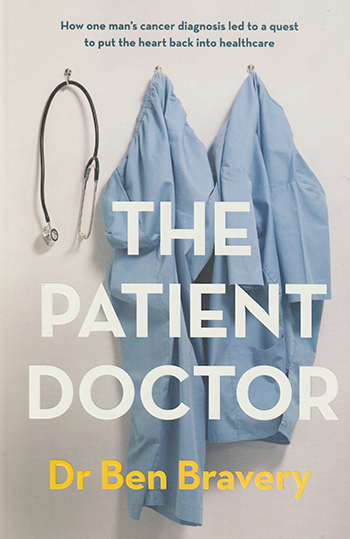The Patient Doctor
Dr Ben Bravery
Hachette Australia 332pp
Book Review by Robin Osborne
At the time of publishing the author of this wonderful memoir of medicine from both sides of the treatment fence – hence the cleverly apt title – was in his final stages of psychiatric training, having completed hospital rotations in the usual fields, including surgery, emergency care, oncology and geriatrics.
As he explains, ‘When it came to taking medical histories from patients, I was always most interested in what we call the ‘social history’. This is the part that allows us to learn more about the patient as a person.
‘Sadly, many doctors tend to reduce this to asking about exercise and whether a patient smokes cigarettes. It can be so much more than this. What about the patient’s home life? Did they live pay cheque to pay cheque? Had they any prior bad experiences in hospital?’
In regard to the last question the author unequivocally responds in the affirmative, having experienced a range of unsatisfactory experiences as a patient as well as many disillusioning ones as a medical intern, bullying by senior doctors being at the top of the list.
What Bravery describes as ‘not your typical cancer memoir’ begins in Beijing where he worked as a zoologist on projects for the Australian and Chinese governments and became ‘something of an expert’ on topics such as what types of male panda urine was most likely to attract females.
One day, at age 28, he noticed blood in the toilet bowl but, unwisely of course, ignored it. Not long afterwards, on a short visit home, he underwent a colonoscopy at the insistence of his feisty, Ballina-born mother, and received a diagnosis of advanced bowel cancer. To put it mildly, his life changed dramatically.
‘The leap from zoologist to cancer patient was not my choice,’ he writes, ‘but the leap from cancer patient to doctor was. That decision – what it’s like on both sides of the hospital curtain, and how medicine can be made better for patients and doctors – is the point of this book.’
It is an exhausting journey through surgery, radiotherapy and chemotherapy, to the logistics of stoma bags and the awkwardness of managing post-operative demands – not least when one decides to continue jogging! Then there was the long slog through med school, bullying again being common, and clinical placements as a mature age student.
Throughout seemingly endless appointments and admissions Bravery is ably support by Sana, a TV presenter he met in China and almost instantly fell in love with. Their relationship is central to the story, as is their (spoiler alert) ultimately successful attempt to fall pregnant through IVF after wisely freezing his eggs eight years prior to the radiation that would render him infertile. The difficult birth of their son is the final breathtaking hospital event in the story.
Damning the much-vaunted concept of patient-centred care as ‘great marketing’, he says that as a patient he rarely felt at the centre, and ‘For a great deal of my care, I felt like a bystander watching things happen around me… I felt like a passenger in someone else’s people mover, a bit closer to the action and moving along with everyone else, but with no idea of where we were going or how long it was going to take.’
He found things were similar on the other side of curtain, too, although he feels there is hope if the system can prioritise the values that make us human – ‘communication, respect, empathy, compassion, kindness and balance.’





